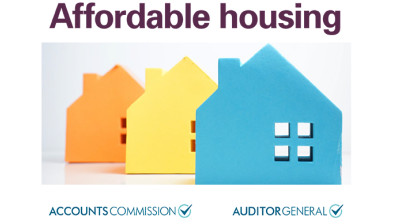Local authorities could run out of cash reserves in two years, report warns
 Councils are showing increasing signs of financial stress and could see their cash reserves run out in two to three years, the local authority watchdog has warned.
Councils are showing increasing signs of financial stress and could see their cash reserves run out in two to three years, the local authority watchdog has warned.
In its annual financial overview published today the Accounts Commission said funding has reduced while costs and demands have increased, and more councils are using reserves to fund services.
The Scottish Government provides around two thirds of council budgets. This fell by 5.2% in 2016/17 to £9.7 billion. 2016/17 was also the last year of the council tax freeze. Council tax provides just 14% of councils’ income.
The report notes that if all councils chose to raise council tax by 3%, it would yield an estimated £68 million - broadly comparable to a 1% pay rise for staff.
Overall council debt rose by £800m in 2016/17 as councils took advantage of low interest rates to fund projects. While not posing an immediate problem some councils are concerned about longer term affordability.
The report highlights a number of financial pressures. A rising proportion of council funding directed towards national priorities such as educational initiatives means councils have to look at deeper cuts in other services. For example, resources for culture, planning and development, and roads have seen the sharpest falls in funding over the last three years.
The report also looks at the current financial year (2017/18) where councils have approved £317m of savings and use of £105m in reserves. Some councils could risk running out of general fund reserves within two or three years if they continue to draw on them at current levels, it said.
The report aims to help councils plan ahead for setting their 2018/19 budgets.
Ronnie Hinds, deputy chair of the Accounts Commission, said: “Our evidence tells us that councils are finding the financial pressures increasingly difficult to manage. The elections in May this year brought in major changes in council administrations across Scotland. Councils that have demonstrated effective leadership and robust planning will be in a better position to deal with the challenges that lie ahead.”
Councils will learn how much the Scottish Government plans to give them next year in a few weeks’ time.
The Scottish Government argued more money was made available for council services through cash for the integration of health and social care and the option of putting up the council tax.
A spokesman said: “We have treated local government very fairly despite the cuts to the Scottish Budget from the UK government.
“Including the extra £250m to support the integration of health and social care, the overall reduction in local government funding in 2016-17 equated to less than 1% of local government’s total estimated expenditure.
“The 2017-18 local government finance settlement, including the increase in council tax and health and social care integration funding, means that local government have an extra £383m, or 3.7%, in support for services compared to 2016-17.”
Local authority group COSLA said the Accounts Commission report is a timely and accurate reflection of the precarious financial position Scotland’s councils finds themselves in and called for a fair settlement from the Scottish Government.
COSLA’s resources spokesperson, Councillor Gail Macgregor, said: “The Accounts Commission is correct. Councils are showing increasing signs of financial stress and face even tougher challenges ahead. Indeed, it is only tough choices and prudent financial management that have allowed us to continue to deliver for communities despite the difficulties.
“The Accounts Commission are also absolutely right to point out that the funding of Councils from the centre has reduced, while costs and demands have increased, and more Councils are having to rely on reserves to fund services.
“As I said when we launched our ‘Fair Funding for Essential Services’ document ‘enough is enough’. Scottish Local Government cannot continue to be the poor relation of the Scottish Public Sector and there really is no more room for manoeuvre.
“Local government is democratically elected and provides a breadth of essential services to Scotland’s communities which support and protect all in our society.
“In all our work, we encourage equality and promote a fairer Scotland through inclusive growth. Recent settlements for local government have put huge pressures on local services and local jobs. Year on year challenges have forced councils to make difficult choices and cut services.
“That is why we are asking that in the 2018-19 Budget there is adequate and fair funding for all local government services and hopefully today’s case set out by Scotland’s financial watchdog will add some weight to our case.”









